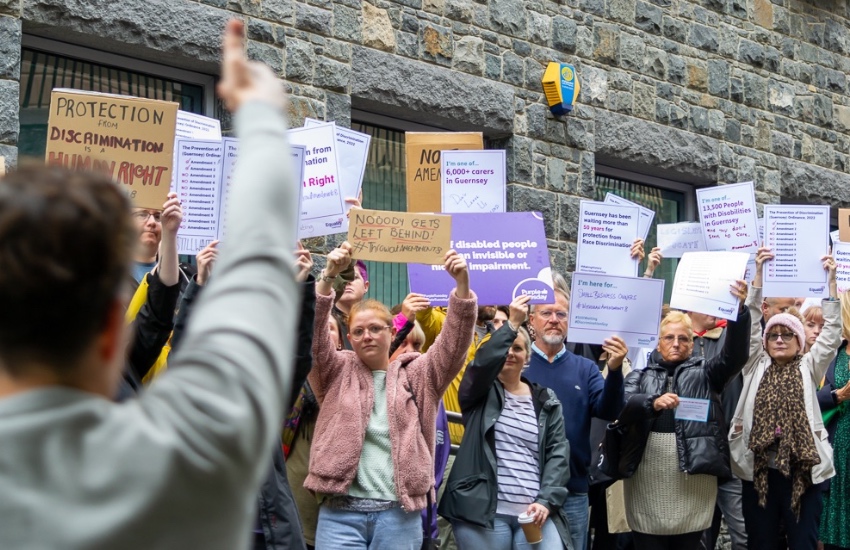


Any company found guilty of the most serious forms of discrimination faces paying up to £10,000 compensation for injury to feelings after the States defeated attempts to rule out such awards to employees or reduce their maximum value.
An amendment from Deputies Nick Moakes and Simon Vermeulen to cut in half the maximum award for injury to feelings, hurt or distress - from £10,000 to £5,000 - was rejected by 17 votes to 19 yesterday afternoon.
An hour later, an amendment from Deputies Neil Inder and Mark Helyar to scrap compensation for injury to feelings, hurt or distress caused by an employer to an employee was rejected by 18 votes to 19.
The maximum award proposed in the draft anti-discrimination law of £10,000 per case was already lower than the maximum award available in Jersey and the UK. That figure will now be retained in the new law if the law is approved by the States' Assembly at the end of a debate which is entering its third day today.

Pictured: Attempts to limit companies' liability against claims for injury following discrimination were led by Deputies Neil Inder (left) and Nick Moakes.
Deputy Moakes, laying his amendment before the States, said: "Whilst larger businesses might be able to absorb a fine of £10,000 very easily, it could have a devastating effect on a small or micro business.
"And it's not only the £10,000 fine itself which these small businesses might face. A small business is unlikely to have in-house lawyers or a full-time human resources professional, so they would probably need to take legal advice and human resources advice, which would significantly add to these costs.
"£5,000 is still a significant amount of money. And let's face it, for most businesses it's the reputational damage rather than the fine itself which will be of greater concern. An employer who cares passionately about his or her employees and falls foul of this [law] by accident will be absolutely devastated.
"In addition, we need to ensure that Guernsey remains competitive, retains existing business and continues to be an attractive jurisdiction for inward investment."

Pictured: Deputy Nick Moakes feared that allowing awards of up to £10,000 for injury to feelings caused by discrimination would be too onerous on small businesses and make Guernsey less attractive as a location to do business.
Deputy Steve Falla, a member of the Committee for Employment & Social Security, which is leading the draft anti-discrimination law in the Assembly, said the maximum award was set at £10,000 to be "dissuasive" against discriminatory behaviour which causes injury and hurt.
Deputy Falla said that States' members had been sent information about "the very severe discrimination which can occur which would attract that top level £10,000". And he reminded the Assembly that the starting point for awards was £500.
Deputy Sasha Kazantseva-Miller, also opposing the amendment to cut the maximum award in half, provided more detail about actual cases in other jurisdictions which had attracted awards at the highest level available.
"The implication is that we don't want to punish businesses for causing, in these cases that I have just read, really serious discriminatory action that profoundly affects the lives of those people," said Deputy Kazantseva-Miller.
"Interestingly, those cases seem clearly to refer to women more than men. This is the type of behaviour which this legislation is trying to punish. If this legislation is to be serious, you have to be serious enough to award this level of compensation."

Pictured: Deputy Sasha Kazantseva-Miller said that Guernsey should not be fearful of becoming less competitive economically by adopting anti-discrimination measures common in other jurisdictions.
After Deputy Moakes' amendment was defeated by only one vote, States' members agreed to suspend the Assembly's rules of procedure to allow Deputies Inder and Helyar to lay their amendment despite it being circulated after the normal deadline for amendments to legislation.
Deputy Inder said that he was particularly concerned about an employer having to pay up to six months' salary to an employee who had proved discrimination and then also having to pay compensation of up to £10,000 for injury to feelings, hurt or distress - and his amendment proposed removing what he said "certainly feels like double jeopardy".
"Under the employer/employee circumstances, should you be discriminated against, you will have an ability to take the employer for the act of discrimination and separately you will have the ability to take the employer through a similar process for injury to feelings," said Deputy Inder.
"The Discrimination Ordinance should go no further than current Guernsey employment law, where the maximum compensation for unfair or constructive dismissal...is six months’ pay. It is also worth noting that there is no concept of injury to feelings in the Employment Protection Law."

Pictured: Deputy Mark Helyar argued that the concept of injury to feelings was too subjective to compensate financially as part of the anti-discrimination law.
Deputy Helyar said he was uncomfortable with the use of the term 'hurt feelings' in the draft law. "Using the term hurt feelings gives rise to an expectation in the future, and with the development of the legislation, that members of the public are entitled to be compensated money because they feel that their feelings are hurt for some reason, and I think that's a slippery slope...that is a hugely subjective area," he said.
Deputy Helyar also doubted whether many businesses and their representative bodies were aware of the proposals regarding compensation awards for injury to feelings.
"Lots of industry organisations are not jumping up and down about this legislation because they haven't read it, they haven't analysed it, they have not been in a situation yet where they need to start thinking about what the costs are and what the implications for them are of these types of problems," he said.
"If you think of your small garage or your decorating company or two or three guys in a building firm, they will have not looked at any of this at all...that's a real concern for me."

Pictured: Deputy Peter Roffey encouraged deputies not to "trivialise" emotional trauma caused by discrimination by removing awards for compensation to employees.
Deputy Peter Roffey, the President of the Committee, said that the States, having just rejected Deputy Moakes' amendment to cut in half the maximum compensation award, should logically vote against Deputy Inder's amendment which went further by scrapping such awards for employees.
"In responses from employer groups, we have had no objections to this [the award of up to £10,000] because they understand that this is normal in every territory," said Deputy Roffey.
"Why do we have to do the same as other places, Deputy Inder says. I would ask rather why does every other territory see the difference between unfair dismissal law...and discrimination law? Because acts of discrimination...are far more likely to involve events that are going to emotionally traumatise somebody.
"Deputy Helyar's got a theory about why the employer groups are not jumping up and down yet - because the penny hasn't dropped about what it's really going to be like. I have to tell him that we have sat down and gone through this with employer representative groups time and time again. They bring their employment lawyers, they go through every point they don't like. If they were really worried about the inclusion of injury to feelings, which has far more serious names we could have put to it, they would have let us know in no uncertain circumstances.
"There is not an anti-discrimination law I can find anywhere that does not involve this concept because of what discrimination can do to people. I think we trivialise what discrimination can do to people if we don't allow this sort of award."
Debate continues on other amendments, after which the draft law, as amended, will be put to the vote.

Pictured: Anti-discrimination campaigners, some of whom are sitting in the public gallery throughout the States' meeting, are being kept waiting for the States to vote on the draft law as debate is going into a third day.
For (17): Deputies Aldwell, Blin, De Lisle, Dudley-Owen, Dyke, Ferbrache, Haskins, Helyar, Inder, Le Tissier, Mahoney, Meerveld, Moakes, Murray, Prow, Queripel and Vermeulen.
Against (19): Brouard, Burford, Bury, Cameron, de Sausmarez, Fairclough, Falla, Gabriel, Gollop, Kazantseva-Miller, Le Tocq, Leadbeater, Matthews, McKenna, Roffey, Soulsby, St. Pier, Taylor and Trott.
Abstained (2): Alderney Representatives Roberts and Snowdon.
Did not vote (1): Deputy Parkinson.
Absent (1): Deputy Oliver.
For (18): Deputies Blin, De Lisle, Dudley-Owen, Dyke, Ferbrache, Haskins, Helyar, Inder, Le Tissier, Mahoney, Meerveld, Moakes, Murray, Prow, Queripel, Taylor and Vermeulen and Alderney Representative Roberts.
Against (19): Aldwell, Brouard, Burford, Bury, Cameron, de Sausmarez, Fairclough, Falla, Gabriel, Gollop, Kazantseva-Miller, Le Tocq, Leadbeater, Matthews, McKenna, Roffey, Soulsby, St. Pier and Trott.
Abstained (1): Alderney Representative Snowdon.
Did not vote (1): Deputy Parkinson.
Absent (1): Deputy Oliver.
Guernsey entering "very dangerous territory" on equal pay
Deputy Ferbrache: "I don't trust Employment & Social Security"
Philosophical belief set to be protected in new law
GALLERY: Anti-discrimination debate set to begin
"About time Guernsey came into line with the rest of the civilised world"
ANALYSIS: Assembly to face its biggest test yet on social policy
Comments
Comments on this story express the views of the commentator only, not Bailiwick Publishing. We are unable to guarantee the accuracy of any of those comments.